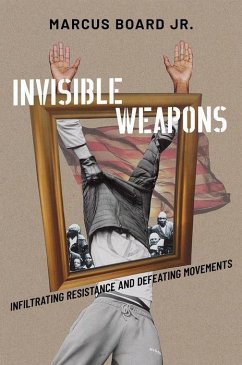In Invisible Weapons, Marcus Board Jr. argues that the grassroots masses have been conned into helping their oppressors by remaining cooperative, committed to non-violence, and striving for equality. These deeply moral approaches are incapable of stopping oppressive governments from continuing to steal power and destroy lives. To support these challenging claims, Board skillfully relies on multiple data sources, including original survey data, in-depth interviews with long-term unemployed welfare recipients, case studies of the Baltimore Uprising and other moments of mass grassroots resistance, and an investigation of Korryn Gaines, one of many unsung victims uplifted by #SayHerName campaigns. Invisible Weapons explains that oppressed people are being targeted systematically by elite powerholders--from elected officials to welfare bureaucrats--and coerced politically into supporting anti-radicalism. In response, Board convinces us to reject this co-optation, to embrace political and community self-defense, and to recommit to our radical political roots in abolition.
Hinweis: Dieser Artikel kann nur an eine deutsche Lieferadresse ausgeliefert werden.
Hinweis: Dieser Artikel kann nur an eine deutsche Lieferadresse ausgeliefert werden.





![Satan's Invisible World Displayed, or, Despairing Democracy [microform] Satan's Invisible World Displayed, or, Despairing Democracy [microform]](https://bilder.buecher.de/produkte/65/65589/65589348m.jpg)


